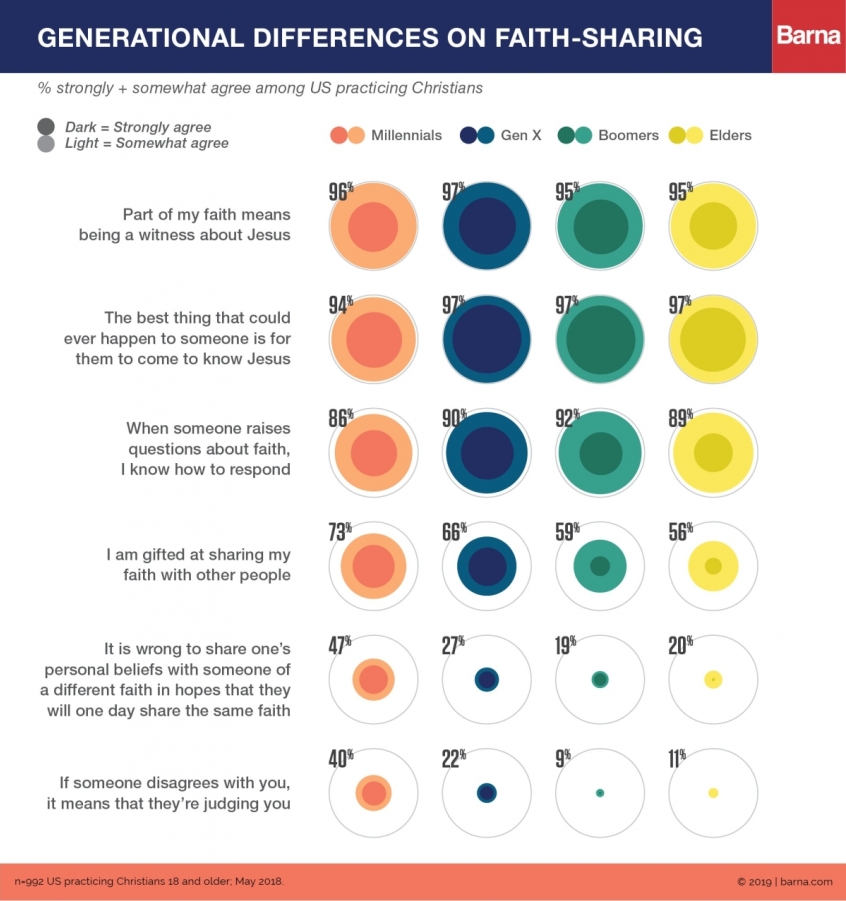Almost half of Millennial Christians in the US believe evangelism is wrong, according to new research from Barna.
The research group's new report, Reviving Evangelism, looks at the faith-sharing experiences and expectations of Christians and non-Christians alike. Among the major findings in this report is the revelation that Christian Millennials – born between 1981-96 – feel especially conflicted about evangelism – and, in fact, almost half believe it is wrong to share their faith.

According to the research, almost all practising Christians believe that part of their faith means being a witness about Jesus. Between 94 and 97 per cent say the best thing that could ever happen to someone is for them to know Jesus.
Millennials feel equipped to share their faith with others, with around three-quarters saying they would know how to respond when someone raised questions about faith – higher than any other generational group, with Gen X at 66 per cent, Boomers at 59 per cent and Elders at 56 per cent.
However, many Millennials are unsure about the actual practice of evangelism. Almost half (47 per cent) agree at least somewhat that it is wrong to share one's personal beliefs with someone of a different faith in hopes that they will one day share the same faith. This is compared to a little over one-quarter of Gen X (27 per cent, and one in five Boomers (19 per cent) and Elders (20 per cent).
According to Barna, younger Christians tend to be more aware of the cultural temperature around spiritual conversations. They are more likely than their elders to have close friends or family members who practise a faith other than Christianity.

Barna argues that sharing the gospel today is made harder than at any time in recent memory by an 'overall cultural resistance to conversations that highlight people's differences'. It also says society today casts a 'negative light on proselytization that many older Christians do not fully appreciate'. Previous research found three out of five Christian Millennials believe that people today are more likely than in the past to take offence if they share their faith – at 65per cent, this is far higher than among Boomer Christians (28 per cent).
Barna Group president said the study highlights a need for Christians to bolster their confidence in certain convictions – among them, the belief that 'evangelizing others is good and worthy of our time, energy and investment'.
'To start, we must pass on resilient faith to Christian young people – this is also a form of evangelism – planning especially for the pivot point of the high school and college-age years,' he said. 'The dropout problem is real, and it has a chilling effect on the overall evangelistic environment. It is impossible to exactly trace the impact of lapsed Christians on non-Christians, but sobering to consider the "de-evangelistic" clout of those who leave the faith.
'Even after they are committed to sustaining resilient faith, we must persuade younger Christians that evangelism is an essential practice of following Jesus. The data show enormous ambivalence among Millennials, in particular, about the calling to share their faith with others.'
He concluded: 'Cultivating deep, steady, resilient Christian conviction is difficult in a world of "you do you" and "don't criticize anyone's life choices" and emotivism, the feelings-first priority that our culture makes a way of life. As much as ever, evangelism isn't just about saving the unsaved, but reminding ourselves that this stuff matters, that the Bible is trustworthy and that Jesus changes everything.'
Barna's report was released as the Church of England prepares to consider a report at its General Synod which claims Anglican churchgoers have a 'total lack of confidence' in speaking about faith 'at all and with anyone'.













